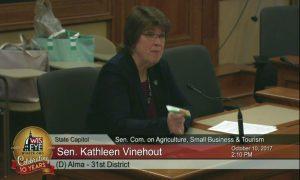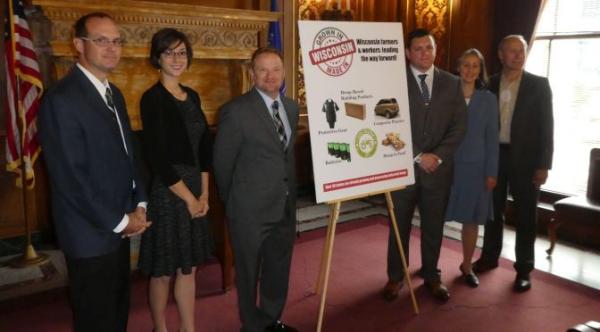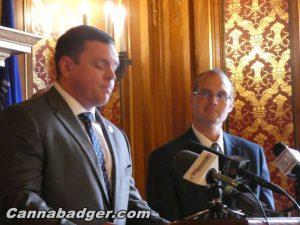MADISON: Industrial Hemp was the focus Tuesday at the Wisconsin Capitol with a press conference and public hearing on SB119, the Farm Freedom Act.
In addition to SB119 Farm Freedom Act sponsors Rep. Jesse Kremer (R-Kewaskum) and Sen. Patrick Testin (R-Stevens Point), the press conference, held in the Assembly Parlor prior to the hearing, featured a number of hemp experts. Those speaking included Jim Holte, President of the Wisconsin Farm Bureau; Kentucky hemp farmer Katie Moyer, Ken Anderson, founder of Legacy Hemp LLC, Dr. Paul Mahlberg, Indiana University professor emeritus of botany and the Wisconsin Farmers Union's Kara O'Connor. Most of the speakers later testified in favor during the hearing as well.
Cannabadger was at the press conference and the plan was to see SB119 get heard but the 10am hearing ran long due to a number of other items. I had to leave after noon. Back home I watched on WisconsinEye. SB119 finally came up after 1:45pm. (The archive of the feed is now available on WisconsinEye)
Rep. Kremer and Sen. Testin to Hold Press Conference before Hearing on Hemp Bill. (Cannabadger.com)
SB119 testimony, began with the bill's two sponsors leading off. Sen. Patrick Testin (R-Stevens Point), Senate sponsor of SB119, was first, detailing the uses of hemp. He noted there were some granola bars with hemp seed available for attendees to sample (I did - delicious!). He asked for support for the growth, production and marketing of hemp. Assembly sponsor Rep. Jesse Kremer (R-Kewaskum) testified alongside Testin, offering historical testimony on hemp in Wisconsin and discussed how the 2014 federal farm bill opened up the possibility of producing hemp in Wisconsin and other states. He discussed CBD oil from industrial hemp.
WATCH: Archived video: SB119 portion begins about 3:20 into the archived video at 1:45pm.
Rep. Dave Considine (D-Baraboo) followed Kremer and Testin. He stated his support for the bill and brought up the three amendments he offered on the bill. He opposes the requirement to destroy crops testing a little high in THC. He said it makes sense to use it for fiber or other uses. He also opposes requiring tribes to get a license through DATCP, which his bill, AB147 does. The third funds the mandate to the University of Wisconsin to test hemp.
Courtney Moran was next speaking in favor, an Oregon-based attorney who grew up in Wisconsin, attended Marquette and is a founding principal of EARTH Law, LLC, and a leading national expert on industrial hemp law. She offered several suggested changes, including agreeing with Rep. Considine's opposition to background checks for farmers. She said provisions on tribal authority need to be clarified and called it discriminatory to not allow a tribal college or university to be part of the program.
She also suggested adding clear authority for propagation whether via seeds or clones.
Senator Kathleen Vinehout (D-Alma), a dairy farmer and 2018 Democratic candidate for governor, holds a hemp granola bar while noting she strongly supports SB119. (Screen grab from Wisconsin Eye)
Sen. Kathleen Vinehout, who was tied up in another hearing earlier, was next. Vinehout, a farmer, cosponsor of the bill and a Democratic candidate for governor in 2018, enthusiastically supports SB119.
Ken Anderson, founder of Legacy Hemp LLC speaks at the Press Conference before Hearing on Hemp Bill. (Cannabadger.com)
Ken Anderson of Legacy Hemp and Katie Moyer of Kentucky Hemp, who both at the press conference, testified in favor together next. She talked about various uses including hemp moonshine, which she displayed a bottle of. She also noted hemp ethanol is 7 times more efficient than that corn. She talked about how James Comer, the former Kentucky agriculture commissioner helped legalize hemp in that state and now is in the US Congress where he has sponsored federal hemp legislation.
Kentucky hemp farmer Katie Moyer speaks at Press Conference before Hearing on Hemp Bill. (Cannabadger.com)
Anderson talked about he worked with Moyer to help get hemp production in Kentucky underway. He also noted Wisconsin's status as a leader in organic farming offers a great opportunity for organic hemp production here. He said a typical Wisconsin farmer already has the equipment they need to farm hemp. He closed by noting in 2016, America imported $500 million in hemp products. Responding to a question, he said seed production can net $900 per acre. The industry does is not looking for subsidies, just to be able to grow.
Sen. Sheila Harsdorf (R-River Falls), another of the seven SB119 cosponsors on the nine-member Agriculture committee. (Cannabadger.com)
Sen. Sheila Harsdorf (R-River Falls), another of the seven SB119 cosponsors on the nine-member committee, discussed CBD oil and Moyer mentioned also using an infusion of the roots as a pain medication, noting there is no CBD or THC in the roots. Moyer discussed how CBD products are helping people who have given up opiates, gabapentin and other prescription meds. Anderson said General Mills and PepsiCo are very interested in marketing healthy foods and hemp is the healthy superfood people have been ignoring, high in omega fatty acids, protein and other nutrients.
Another hour or so of testimony followed. It was a good day for the restoration of the Wisconsin hemp industry. An Assembly public hearing will be coming soon, per Rep. Kremer. With any luck, Wisconsin might soon join the other 30 or so states that allow hemp production. Patients using CBD oil under 2017 Wisconsin Act 4 would also have a Wisconsin-sourced legal supply if SB119 is enacted.https://docs.legis.wisconsin.gov/2017/related/acts/4



